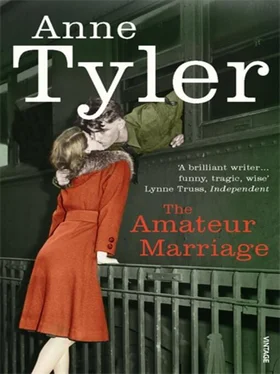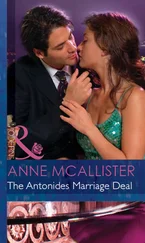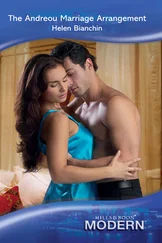The Kowalskis came with Jerry and Jerry’s girlfriend and Mrs. Sweda, who was Mrs. Kowalskis sister. The Witts came. Mrs. Serge and Joey came.
Mrs. Anton and Michael came.
Mrs. Anton looked even drearier than usual, and she barely responded when her neighbors said hello. She wore a gray tweed overcoat and thin, short socks half swallowed by her brown oxfords. Her hands were thrust deep in her pockets; it was Michael who carried his lunch, in addition to a mildewed black gladstone bag. Around his neck he had wound Pauline’s scarf — broad bands of navy blue and white, a pattern any neighborhood girl would have considered too simple.
Just as they arrived, a beefy man in uniform lumbered down the steps of the bus with a clipboard under one arm. No one had even known he was there; all they had seen was the driver, who sat staring ahead expressionlessly with the motor loudly idling.
“All right, men,” the man in uniform called. “Line up here to my left.”
People began milling in his direction, the relatives as well as the recruits. Michael, however, stayed where he was. He gazed northward, straight up Broadway to where it crossed Eastern Avenue.
“Move along, men. Say your goodbyes.”
Mr. Kowalski raised his Kodak and snapped a picture of Jerry grinning stiffly and unnaturally. Jerry’s little sister blew on a painted tin horn. His girlfriend threw her arms around him and buried her face in his neck.
“Let’s get going, men, double-time.”
But it was from the east, from St. Cassian Street, that Pauline came running. She had her red coat on, which was how they could all spot her from such a distance. They said, “Michael! Look!” and Michael turned at once in the right direction, although Pauline herself had not called out. When she came nearer they could see why. She had no breath left, poor thing. She was gasping and tousle-haired and flushed — really not at her prettiest, but who in the world cared? She was holding out her arms, and Michael dropped his belongings and started running too, and when they collided he swooped her up so her feet completely left the ground. Everybody said “Ah” in one long, satisfied sigh — everybody except his mother, but even she watched with something close to sympathy. How could she not? They were hugging as if they would never let go, and Pauline was speaking in broken gasps: “… thought you were leaving by train, but… went to your house… went to Wanda’s… finally asked a man on the street and… Michael, I’m so sorry, I’m so sorry, I’m so sorry.”
“All aboard!” the man in uniform bellowed.
Michael and Pauline tore apart. He turned and went back for his belongings. He ducked his head to let his mother kiss him. He sent one last look toward Pauline and then he climbed onto the bus.
When it pulled out, Pauline and Mrs. Anton were standing side by side, both waving with all their hearts.
Now carved wooden creches and plaster Santas and ten-inch-tall, cone-shaped green straw Christmas trees blobbed with soap-flake snow stood among the flags in the parlor windows. Mrs. Szapp’s famous angels — a dozen of them, handblown glass — fought for space beneath the palm fronds. Mrs. Brunek marched eight china reindeer straight across her map of Czechoslovakia.
Almost none of the boys who’d enlisted returned for the holidays. They had left too recently; they were confined to their various posts. In theory, this was something that their families had been prepared for, but still it came as a shock. The streets all at once seemed so quiet. Their sons’ bedrooms seemed so empty. The dinner tables were too sedate and orderly — no long-armed, greedy boys pouncing on the last chicken wing or gulping down milk by the quart.
Instead, there were mere letters, all of which might have been written by the same person. “Got a ‘grand’ bunch of guys in my unit” and “You wouldn’t believe the tons of gear we have to lug” and “Sure do miss those Sunday evenings with you folks around the radio.” These identical lines, with only minor differences, were read aloud in the grocery store by Mrs. Witt, Mrs. Serge, Mrs. Kowalski, Mrs. Dobek… and yet their sons were not alike in any way, or at least had not seemed so till now. “Could take my weapon apart blindfolded and put it together again,” Michael Anton wrote — Michael! so peaceful, so unmechanical! — as did Joey Serge and Davey Witt. It wasn’t just their similar experiences (the KP duty, tetanus shots, blistered feet) but the way they worded things — the slangy, loping language, with too many sets of quotation marks and not enough commas. “Took a 20 mi. hike yesterday and I can tell you my ‘dogs’ are the worse for it… Wish you could see how neat I make my bed mom now that I’ve got a ‘sarge’ standing over me watching.”
Maybe the letters they wrote their girlfriends were more distinctive. Or maybe not; who knew? There were only so many ways to say “I love you” and “I miss you.” But their girlfriends kept their letters to themselves, disclosing only a sentence or two and then just to the other girls. So the older women had to speculate about that.
Michael wrote Pauline every day, Katie and Wanda reported. Sometimes he wrote twice a day. But none of the lines they quoted revealed anything interesting. He didn’t like the food. The guy in the bunk next to him had a constant, honking cough. Life in camp alternated between working your head off one moment and sitting around, sitting around, sitting around the next, just waiting for the war to be over. By now it was a whole new year, 1942, and you would have thought they could have wrapped things up weeks ago.
Every so often, in the late afternoon, the three girls would stop by Anton’s Grocery — Katie and Wanda and Pauline, sometimes with Pauline’s friend Anna tagging along. “How are you bearing up, Mrs. Anton?” Pauline would say. “Michael asked me to check on you. He’s worried how you’re doing. Have you heard from him lately?”
Mrs. Anton was her usual gray self (“If he’s as worried as all that, he never should have gone and enlisted,” she said once), but those who knew her well could detect the gratified pleats at the corners of her mouth. And she always said, “ You’ve heard, I guess,” which was her devious way of asking without asking.
“Yes, a letter came this morning. He’s managing okay, he says.”
After the girls had left, the women would tell Mrs. Anton how sweet it was of Pauline to stop by. “She’s trying to be nice,” they told her. “You have to hand her that much.”
Mrs. Anton just said, “Hmpf. For somebody holding down a job, she certainly has a lot of spare time, is all I can say.”
Mrs. Anton had hired a colored man to help out in Michael’s stead. Eustace, his name was. He was small and dry and toasty brown, of an indeterminate age, and he always wore a suitcoat over his bib overalls. Any time Mrs. Anton assigned him a chore, he said, “Yes-sum,” and touched the brim of his hat in a dignified and respectful manner, but she told the other women she couldn’t wait to be rid of him. “This is a family business,” she said. “I can’t afford to hire some stranger off the streets! I just want Michael home again. I don’t understand what’s keeping him.”
In February he did come home, but only briefly. By this time people were growing accustomed to the sight of uniforms in their neighborhood, their sons returning for visits in glaringly short haircuts and government-issue woolens. But Michael seemed more changed than the other boys. His face was positively gaunt, with hollows below the cheekbones and shadows the color of bruises underneath his eyes. He was less attentive to his mother, almost not in evidence around the store, and absentminded when friends addressed him on the street. Every fiber of his being, it seemed, was focused on Pauline.
Читать дальше












